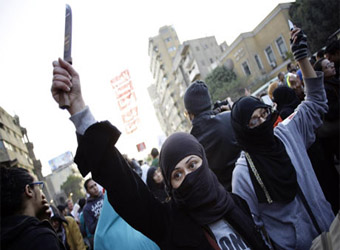Their faces painted with the red, white and black of the Egyptian flag, many women led marches and fierce chants Monday, defying one of the dark realities of more than two years of protests in Egypt—the widespread sexual violence against women who are participating in, or simply present at, antigovernment rallies.
On Sunday, roughly 50 women, among them a foreign female journalist, were sexually assaulted in Tahrir Square, according to three human-rights groups focusing on violence against women in Egypt.
Their faces painted with the red, white and black of the Egyptian flag, many women led marches and fierce chants Monday, defying one of the dark realities of more than two years of protests in Egypt—the widespread sexual violence against women who are participating in, or simply present at, antigovernment rallies.
On Sunday, roughly 50 women, among them a foreign female journalist, were sexually assaulted in Tahrir Square, according to three human-rights groups focusing on violence against women in Egypt.
Some women, carried on the shoulders of men, led chants with megaphones. Others led marches to Tahrir Square as they smacked wooden shoes in order to shoo away Mr. Morsi and the Muslim Brotherhood. Female artists also joined in the marches, including prominent Egyptian actress Maha Abo Ouf and female pop star Angham.
At some points during the day on Sunday, women outnumbered men in Tahrir Square and at other protests throughout the country, as many men had to be at government offices for work during early hours of the day, said Dalia Ziada, executive director of Ibn Khaldun Center for Development Studies.
“Their voices overtook the voices of men,” said Ms. Ziada.
The outbreak of violence against women at Sunday’s protests was only the latest of the sort. The issue came to international prominence in Febuary 2011 when correspondent Lara Logan was sexually assaulted on the day as Egyptians celebrated the overthrow of Hosni Mubarak. Months later, in televised interviews, Ms. Logan discussed the violence she witnessed.
Several rights groups confirmed that one foreign female journalist was among those sexually assaulted during Sunday’s protests. They declined to identify the journalist, citing privacy concerns.
“Mohamed Morsi and the Muslim Brotherhood have fostered an atmosphere where journalists are attacked with impunity,” said Sherif Mansour, the Middle East and North Africa coordinator for the Committee to Protect Journalists, whose report on Monday cited the raped journalist.
The presidency’s office condemned the violence and sexual attacks, said Ehab Fahmy, a presidential spokesperson. Such attacks aren’t in the nature of the Egyptian people, he said Sunday, adding that the state doesn’t deal with such crimes lightly.
A 2008 survey by the Egyptian Center for Women’s Rights found that 83% of Egyptian women had been subjected to sexual harassment in their lifetime.
Much of the recent protest-linked violence has been systematic, victims and human rights workers allege. The violence, they have said, is a tactic employed by those who want to discourage protests—in part to send a message to Egypt’s fathers and brothers that they should encourage the women in their family to stay at home.
Such attacks have appeared coordinated, with several men joining in at once, according to Fathi Said, a coordinator for an Anti-Sexual Harassment campaign in Cairo. Most attackers target women by using pocket knives, small clubs and their bare hands to undress the women to carry out their attacks, according to women who spoke publicly about their attacks as well as human rights groups.
After the attack starts, many other men who may not be politicized join in, in what becomes an instance of mob violence, said Mrs. Said of the Cairo Center for Development and Human Rights, who is no relation to Mr. Said of the Anti-Sexual Harassment campaign.
“This is sexual terrorism,” according to Mr. Said, whose group deployed men and women across Cairo on Sunday in bright orange traffic vests to spot out harassers in order to protect women.
In February, Mervat Tallawy, who heads Egypt’s state-run National Council for Women, said sexual assaults against women have been led by organized gangs to scare women from participating in political life. Mrs. Tallawy also denounced the exclusion of women from political life since and the increased sexual attacks.
Similar allegations were voiced by the United Nation’s Commission on the Status of Women, which in March issued a report—called End Violence Against Women—that also called for allowing women full equality in marriage, allowing them to decide on matters of reproduction and abortion, and letting women take charge of family spending.
The country’s ruling Muslim Brotherhood party loudly rejected the report, and called its title “misleading and deceptive.”
The Brotherhood also added that the declaration, if ratified, would lead to disintegration of society and undermine Islamic ethics and destroy the family. The report called on granting human rights to women and allowing them to decide on matters of reproduction and abortion.
“Women’s demands are also demands of the Egyptian revolution,” said Mrs. Said. “The demands aren’t factional, but women went to the streets because they felt that their rights, which they worked hard to achieve throughout their civil rights movement, are being threatened.”
Source: Wall Street Journal



